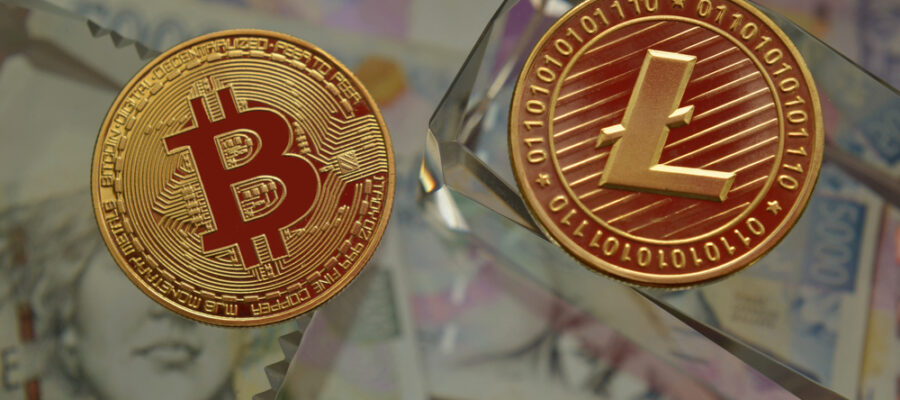Litecoin vs Bitcoin
The validation of a new blockchain takes place every two and a half minutes in Litecoin. In Bitcoin, validation happens every 10 minutes.
The two blockchains’ maximum block size is 1MB. However, the execution of SegWit protocols aids in expanding the data added to each block for both.
Since blocks are 4X quicker, Litecoin halving events were also changed. Bitcoins halves every 210000 blocks, while LTC every 840000 blocks.
Due to the changes, it becomes possible for Litecoin to imitate the mining course and supply of Bitcoin. Bitcoin’s capping occurs at 21 million coins, while Litecoin is capped at 84 million, enabling a cheaper Litecoin price.
The hashing algorithm, the mathematical formula that scrambles data for safe storage, is another technical difference. Litecoin utilizes Scrypt, which seeks to make it more difficult for specialized mining hardware to dominate compared to Bitcoin’s SHA-256 hashing algorithm.
This minimized the centralized mining risks in the initial days since it made mining accessible to people with a home computer. Nevertheless, this was momentary, since mining software now is in place in managing the application-specific integrated circuits (ASICs) with Scrypt.
Benefits of Utilizing Litecoin for Transactions
Quicker transactions: Litecoin transactions are fast, typically validated in 2.5 minutes. Upgrades such as Lightning Network can make this instantaneous.
Trading pair: The high supply, liquidity, high transaction speed, and low liquidity of Litecoin makes it a popular trading pair for traders to move in and out of positions.
How to Purchase and Store Litecoin Securely
The stages of purchasing Litecoin include:
- Registering an account on an exchange. One must submit a government ID and pass Know Your Customer (KYC) checks.
- Depositing funds into the account. It may be fiat currency through bank transfer or credit card.
- Using funds to purchase or trade for Litecoin within the exchange platform.
- Withdrawing Litecoin to store it in the selected crypto wallet.
There is a vast range of options to store Litecoin. Examples include:
- Hardware wallets: They are the securest storage option, enabling people to store Bitcoin offline.
- Software wallets: They store Litecoin directly on one’s phone or computer, improving accessibility.
- Exchange wallets: They are useful in case one regularly trades or does not want complete responsibility for Litecoin.
Mining Litecoin
Litecoin uses mining to secure the network, validate transactions, and generate new coins. Its mining resembles Bitcoin mining, which entails validating and incorporating transactions into the blockchain.
To mine, computers solve a cryptographic puzzle. The first one to solve it is rewarded for its work by validating a new block onto the blockchain and acquiring LTC as an award.
Staking in Litecoin
Litecoin staking is available. However, the PoW architecture prevents it from happening directly on the Litecoin blockchain.
Earning interests and yields using third-party platforms and decentralized finance protocols is a possibility.
Litecoin’s Role in Crypto
There is an increase in the number of people embracing Litecoin to goods and services payment. According to the recent stats, it is the most commonly utilized crypto for transactions.
With regard to Bitcoin’s development, Litecoin plays an important role. Its historical stability and likeness make it valuable as a test protocol for the ‘digital gold.’
Litecoin as a Perfect Investment
Several other cryptocurrency competitors boast inexpensive and quick transactions. However, Litecoin’s stability and history as a blockchain still make it a leader in everyday payments for goods and services.
Researching and understanding Litecoin’s future predictions is Important.
Commonly Asked Questions
How is Litecoin utilized?
It is designed to be a payment method that has low fees and quick transaction times.
Is Litecoin better compared to Ethereum?
Ethereum blockchain being more advanced. Nevertheless, Litecoin is the better option because of its speed and simplicity.
Is Litecoin better compared to Bitcoin?
The two have different use cases. Bitcoin may be better for a long-term store of value, while Litecoin is appropriate for quick, low-cost transactions.
All trademarks, logos, and images displayed on this site belong to their respective owners and have been utilized under the Fair Use Act. The materials on this site should not be interpreted as financial advice. When we incorporate content from other sites, we ensure each author receives proper attribution by providing a link to the original content. This site might maintain financial affiliations with a selection of the brands and firms mentioned herein. As a result, we may receive compensation if our readers opt to click on these links within our content and subsequently register for the products or services on offer. However, we neither represent nor endorse these services, brands, or companies. Therefore, any disputes that may arise with the mentioned brands or companies need to be directly addressed with the respective parties involved. We urge our readers to exercise their own judgement when clicking on links within our content and ultimately signing up for any products or services. The responsibility lies solely with them. Please read our full disclaimer and terms of use policy here.

